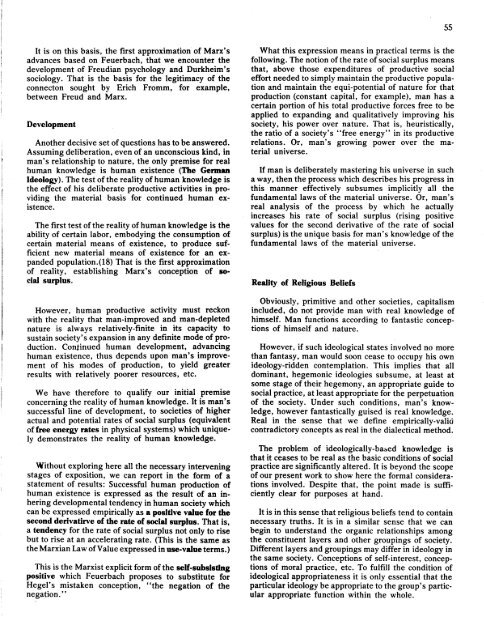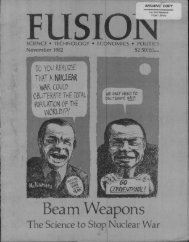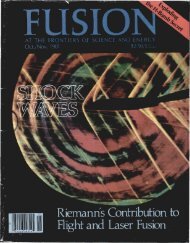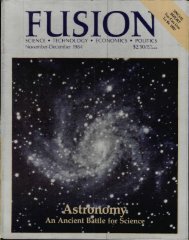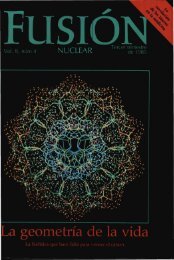New Left, Local Control, and Fascism
New Left, Local Control, and Fascism
New Left, Local Control, and Fascism
You also want an ePaper? Increase the reach of your titles
YUMPU automatically turns print PDFs into web optimized ePapers that Google loves.
55<br />
It is on this basis, the first approximation of Marx's What this expression means in practical terms is the<br />
advances based on Feuerbach, that we encounter the following. The notion of the rate of social surplus means<br />
development of Freudian psychology <strong>and</strong> Durkheim's that, above those expenditures of productive social<br />
sociology. That is the basis for the legitimacy of the effort needed to simply maintain the productive populaconnecton<br />
sought by Erich Fromm, for example, tion <strong>and</strong> maintain the equi-potential of nature for that<br />
between Freud <strong>and</strong> Marx. production (constant capital, for example), man has a<br />
certain portion of his total productive forces free to be<br />
applied to exp<strong>and</strong>ing <strong>and</strong> qualitatively improving his<br />
Development society, his power over nature. That is, heuristically,<br />
the ratio of a society's "free energy" in its productive<br />
Another decisive set of questions has tobe answered, relations. Or, man's growing power over the ma-<br />
Assuming deliberation, even of an unconscious kind, in terial universe.<br />
man's relationship to nature, the only premise for real<br />
human knowledge is human existence (The German If man is deliberately mastering his universe in such<br />
Ideology). The test of the reality of human knowledge is a way, then the process which describes his progress in<br />
the effect of his deliberate productive activities in pro- this manner effectively subsumes implicitly all the<br />
viding the material basis for continued human ex- fundamental laws of the material universe. Or, man's<br />
istence, real analysis of the process by which he actually<br />
increases his rate of social surplus (rising positive<br />
The first test of the reality of human knowledge is the values for the second derivative of the rate of social<br />
ability of certain labor, embodying the consumption of surplus) is the unique basis for man's knowledge of the<br />
certain material means of existence, to produce suf- fundamental laws of the material universe.<br />
ficient new material means of existence for an exp<strong>and</strong>ed<br />
population.(18) That is the first approximation<br />
of reality, establishing Marx's conception of social<br />
surplus. Reality of Religious Beliefs<br />
Obviously, primitive <strong>and</strong> other societies, capitalism<br />
However, human productive activity must reckon included, do not prov!de man with real knowledge of<br />
with the reality that man-improved <strong>and</strong> man-depleted himself. Man functions according to fantastic concepnature<br />
is always relatively-finite in its capacity to tions of himself <strong>and</strong> nature.<br />
sustain society's expansion in any definite mode of production.<br />
Continued human development, advancing However, if such ideological states involved no more<br />
human existence, thus depends upon man's improve- than fantasy, man would soon cease to occupy his own<br />
ment of his modes of production, to yield greater ideology-ridden contemplation. This implies that all<br />
results with relatively poorer resources, etc. dominant, hegemonic ideologies subsume, at least at<br />
some stage of their hegemony, an appropriate guide to<br />
We have therefore to qualify our initial premise social practice, at least appropriate for the perpetuation<br />
concerning the reality of human knowledge. It is man's of the society. Under such conditions, man's knowsuccessful<br />
line of development, to societies of higher ledge, however fantastically guised is real knowledge.<br />
actual <strong>and</strong> potential rates of social surplus (equivalent Real in the sense that we define empirically-valk)<br />
of free energy rates in physical systems) which unique- contradictory concepts as real in the dialectical method.<br />
ly demonstrates the reality of human knowledge.<br />
The problem of ideologically-ba_ed knowledge is<br />
that it ceases to be real as the basic conditions of social<br />
Without exploring here all the necessary intervening practice are significantly altered. It is beyond the scope<br />
stages of exposition, we can report in the form of a of our present work to show here the formal considerastatement<br />
of results: Successful human production of tions involved. Despite that, the point made is suffihuman<br />
existence is expressed as the result of an in- ciently clear for purposes at h<strong>and</strong>.<br />
hering developmental tendency in human society which<br />
can be expressed empirically as a positive value for the It is in this sense that religious beliefs tend to contain<br />
second derivatirve of the rate of social surplus. That is, necessary truths. It is in a similar sense that we can<br />
a tendency for the rate of social surplus not only to rise begin to underst<strong>and</strong> the organic relationships among<br />
but to rise at an accelerating rate. (This is the same as the constituent layers <strong>and</strong> other groupings of society.<br />
the Marxian Law of Value expressed in use-value terms.) Different layers <strong>and</strong> groupings may differ in ideology in<br />
the same society. Conceptions of self-interest, concep-<br />
This is the Marxist explicit form of the self-subsisting tions of moral practice, etc. To fulfill the condition of<br />
positive which Feuerbach proposes to substitute for ideological appropriateness it is only essential that the<br />
Hegel's mistaken conception, "the negation of the particular ideology be appropriate to the group's particnegation."<br />
ular appropriate function within the whole.


